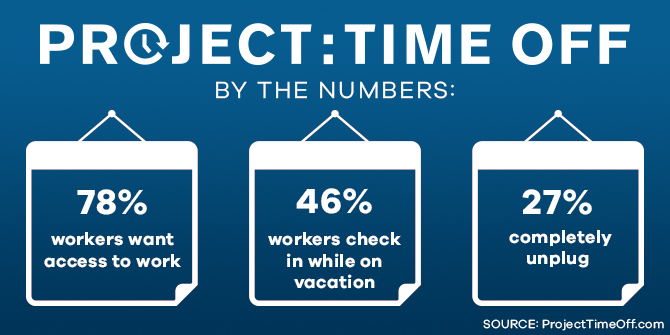Let’s face it: working too much is an epidemic. Stringing along that 9-5 day job into the early hours of the evening or even late at night is contributing to higher stress levels in the workplace and at home. As a way to fix that, Project: Time Off was launched to encourage employees to use up their vacation time.
Jan. 30 is National Plan For Vacation Day, the perfect time to stop and take a minute to think about where you want to go this year, and budget your time off accordingly. Americans say vacation time is one of the most important benefits given to them by their employers, yet more than 662 million vacation days were left on the table last year. In fact, 93 percent of workers say time off is important, but only 59 percent of employees actually took advantage of vacation time.
Why?
Excuses, Excuses
Fear is a driving force as to why more than half of Americans aren’t using up their vacation days. From the fear of missing out on something big at work to being worried about returning to a mountain of work, the excuses are endless.
Many cite pressures within the job to perform, the fear nobody can complete the job while the person is out, or a fear of being replaced while on vacation. While valid reasons for being worried, employers should encourage their workers to take the time off free from these fears.
Think about it this way: not taking your vacation time can translate into a missed opportunity to develop the talent of your own employees who’s potential might be overlooked with the attitude “no one else can do the job.”
Jim Moffatt, CEO of Deloitte Consulting, may have said it best: “If your business can’t survive your vacation, you’ve got a bigger problem.”
Benefits
Being overworked can lead to higher stress levels and employee burnout, both of which are negative for productivity. Statistically speaking, 72 percent of managers say employees are more likely to put in longer hours when it matters after having and using up vacation time.
When a person is rested and takes a break from the routine of work, they return with higher levels of happiness and clarity. Usually, that positive attitude rubs off on other employees, boosting morale. This is because their renewed energy and sense of contentment is contagious and can be spread to their colleagues. As a supervisor, you can have a hand in encouraging your employees to take a break for the benefit of the whole team.

By the Numbers
Once employees are encouraged to take time off, they should also be encouraged to unplug from the office remotely. 78 percent of workers have said they’d like to have access to work while on vacation if they so choose. About 46 percent of vacationers often check in, opposed to the 27 percent who actually unplug. Not surprisingly, 10 percent of those who do not unplug while on vacation use less vacation time than those who unplug. Here’s the kicker: 40 percent of employees who work in cultures that do not support unplugging say they are looking or planning to look for a new job in the next year.
Snuff out the FOMO (Fear of Missing Out)
So how do employers increase retention and encourage their employees to unplug? There are a couple of ways this can be done:
- Email detox: pointing people to someone else and suggesting they reconnect upon return.
- Adopting an “unplugged” attitude while on vacation and making a conscious effort not to check email or work on projects
- Providing a set week or two of time off for employees where offices are closed and employees are forced to unplug because they lack access to email servers or Wi-Fi (companies like TED do this for two weeks a year).
While many workers say they don’t want to let down their boss by taking time off, it’s scientifically proven that a recuperation period is what American workers need. Only 39 percent of non-managerial staff say they feel supported in taking their vacation time. While 91 percent of managers say they encourage time off, only about 43 percent actually talk to their employees about it. It’s worth a conversation for everyone’s sake.







